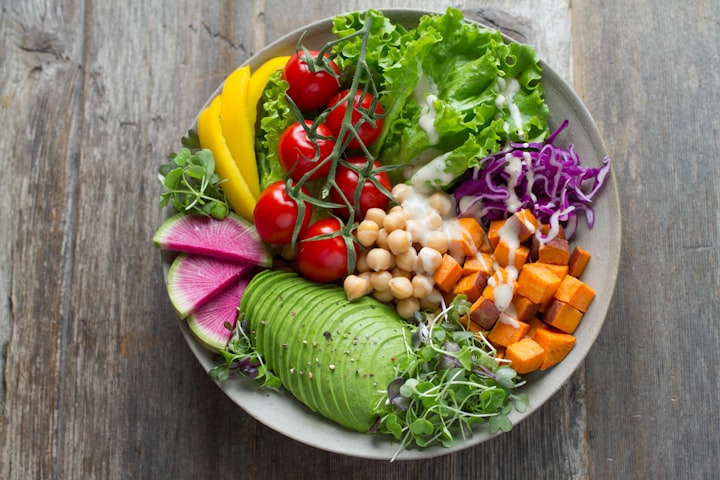How to Fall in Love With Eating Vegetables
If the mere thought of eating cauliflower or spinach makes you sick, this is for you.

I'm not here to tell you that you need to eat your vegetables whether you want to or not. I'm not here to tell you how good they are for you or how essential they are if you're serious about getting healthy and staying that way either. You already know, because your mother, your grandmother, and every fitness guru ever born has been telling you that your entire life.
I am here to tell you that I used to be someone whose enthusiasm for vegetables was limited at best. There were very few of them that I could actually eat without gagging, and at one point, I figured I'd never master that particular aspect of being a real adult. Getting older has a way of making you increasingly concerned about your health though, so I knew I'd better learn to at least tolerate them as a regular part of my diet.
Not only did I successfully do that, but I surprised even myself by learning to love cooking, serving, and eating vegetables. I'm not just talking about the popular ones like corn or potatoes either. At this point, I'm struggling to think of even a single vegetable I haven't learned to like in at least one or two different contexts, and if I can do it, you can too. Here's how I made it happen.
Blame the cooking method, not the vegetable.
There are a lot of foods out there that are still pretty decent even when they're not prepared all that well, like hamburgers or pizza. This isn't the case with most vegetables. It's really easy to screw up a vegetable, especially if you don't actually realize it's not supposed to taste (or smell) like wet gym socks.
If the household you grew up in was anything like mine, most of the vegetables you were served probably came out of a can. A canned vegetable is already cooked within an inch of its life during the canning process, so it's already way behind as far as taste and texture are concerned before it even hits your plate. Plus, overcooking vegetables causes them to lose many of the nutrients and health benefits you're eating them for in the first place. The fact that canned veggies are packed with sodium doesn't help either.
Worst of all, overcooked vegetables taste like hot, wet garbage, and they smell even worse. A few of the hardier vegetables (like corn or beans) can survive the canning process without becoming God-awful in the process, but they're in the minority. Canning pretty much destroys veggies like green beans, spinach, or peas though, and they taste like it. Children who grow up eating them like that become adults who think that's how vegetables are supposed to taste, and it absolutely is not.
Banishing canned vegetables from your kitchen for the most part is the first thing you should do if you're serious about learning to love your veggies. Choose fresh produce whenever you can. Learn how to break down and cook produce correctly so that it retains its nutritional value and flavor. (It's easier than you think it is. I promise.)
If you're reluctant to give up the convenience that cans bring to the table, make the switch to flash frozen vegetables instead. They're frozen very shortly after harvest, if not immediately after, so they still have their color, nutritional value, and flavor to the same extent fresh veggies do. They're also already prepped and ready to cook, so they're perfect for busy weeknights when you don't even want to think about scrubbing, peeling, or chopping something fresh.
Understand the importance of seasoning.
Foods people have zero trouble liking and developing cravings for are filled with unhealthy things that make them taste as good as they do. (Think fat, sugar, way too much sodium, and tons of chemical additives.) Healthy, good-for-you foods like fresh vegetables don't come attached to any of that. They are packed with flavor, but bringing it out and helping it shine requires a little TLC on your part.
Seasoning is the key to making your vegetables come alive and taste their best. Don't overdo the salt, but a pinch or two is important for bringing out a veggie's natural flavor and keeping it from tasting flat. Experiment with other spices and herbs as well until you hit on some flavor combinations you like.
I'm a big fan of carrots, parsnips, and other root vegetables braised in a little broth and seasoned with fresh herbs like tarragon, cilantro, basil, or parsley. My husband - a former Brussels sprout and cabbage hater - now loves both enough to request them special if I sauté them before finishing them with red pepper flakes and a touch of brown sugar.
Treat your vegetables with the care they deserve, and you'll be amazed at the difference in how they taste. Even salads and raw vegetable platters can really sing when you add the right sauce, seasoning, or healthy dip to the mix. Try to keep things health-conscious by making light but flavorful choices. The beauty of a good creamy ranch or bleu cheese dressing can't be denied, but the right zesty vinaigrette can be just as tasty while also being good for you.
Embrace the idea of seasonal (and local) eating.
Thanks to the wonders of transportation and the modern world, you can get your hands on just about any vegetable you want whether it's in season or not. Vegetables taste their best when they are in season though, so it's worth your while to experience them that way. They're a lot cheaper as well, so your wallet will be thanking you right alongside your taste buds.
Stay in the know as to what's in season now (or any time of the year) by bookmarking a handy produce guide and referring to it when you're ready to get acquainted with some new options. Each season, make it a point to try at least one or two veggies that are either brand new to you or that deserve a second chance because you've only ever had them out of a can before. Research different ways to prepare them, and give some new ideas or combinations a try.
Do yourself a favor and start visiting your local farmer's market on a regular basis as well. Nothing gets you excited about the idea of cooking and eating vegetables quite like the sight of them beautifully arranged in a market stall. Farmer's markets are also a great way to get to know local farmers and support your community.
The same goes for community supported agriculture (CSA) programs. We absolutely love the local program we connected with in Salinas, California near where we live. The farmers who run it handpick a beautiful selection of vegetables and fruits for us every week, as well as deliver our boxes right to our door. They offer us access to extras like fresh eggs, locally grown flowers, and raw local honey if we want some as well.
Our CSA has introduced my family and me to veggies I never would have thought to try on my own. Plus, it just plain feels good to know we're doing our part to support local agriculture, small business, and our community. Quite a few areas have similar programs, so definitely research what's available in your area and get involved.
Give each vegetable more than one chance.
Vegetables are actually a lot like people. Some you like right away without having to think twice about them. Others may need to grow on you a little bit, but can easily become favorites once they do. It's usually only a few that add up to an outright clash you can't overcome on any level.
In other words, you owe it to yourself to give each vegetable you try more than one chance if you don't fall in love with it the first time. A lot of foods need to be tried well more than once before you start genuinely liking them, especially if you're trying to overcome a past aversion to something specific.
There are countless vegetables I thought I loathed to depths of my soul and swore I'd never eat again that I now absolutely love. Beets, cabbage, Brussels sprouts, tomatoes, peas, and green beans are just a few I can name right off the top of my head.
I don't love all of those in every possible style they can be prepared. (For instance, I still strongly dislike cold beets and big chunks of cooked tomato. Don't even get me started on the abomination that is green bean casserole.) I have discovered a wide variety of dishes and preparation styles that bring out the best in them according to my own palate. With time and experimentation, you will as well.
Life's too short and food is too wonderful a thing not to fully appreciate all it has to offer. Vegetables can (and should) have a place in any well-rounded diet. Learn how to treat them right, and your only regret will be not doing so a lot sooner in life.
About the Creator
Shannon Hilson
I'm a full-time copywriter, blogger, and critic from Monterey, California. Outside of the work I do for my clients, I'm a pretty eclectic writer. I dabble in a little of everything, including fiction and poetry.






Comments
There are no comments for this story
Be the first to respond and start the conversation.